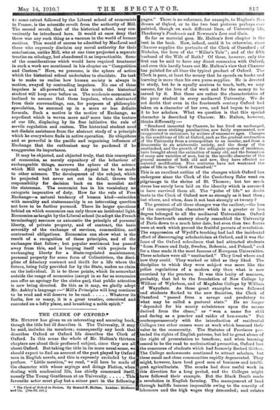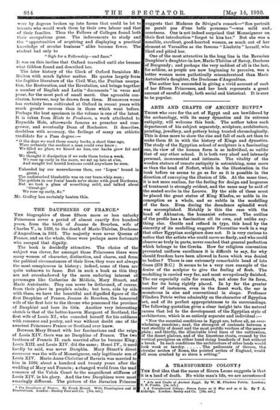THE CLERK OF OXFORD.*
Mn. HITLTON has given us an interesting and amusing book, though the title but ill describes it. The University, it may be said, includes its members; consequently any book that describes Oxford or Oxford life describes the Clerk of Oxford. In this sense the whole of Mr. Ffulton's thirteen chapters are about their professed subject, since they are all about Oxford. But taking the title in its more usual sense, we should expect to find an account of the part played by Oxford men in English novels, and this is expressly excluded by the preface. "Little mention," we read, "will here be made of the character with whose sayings and doings Fiction, when dealing with academical life, has chiefly concerned itself,
namely The Young Gentleman at an University This favourite actor must play but a minor part in the following
• The Clerk of Orford in Fiction. By Samuel P. Bolton. London : Methuen and Co. LI0e. 6d. net.] pages." There is no reference, for example, to Hughes's Tol,b Brown at Oxford, or to the two best pictures perhaps elev painted, though on such different lines, of University life, Thackeray's Pendennis and Newman's Loss and Gain.
So far as material goes, Mr. Hulton's first chapter is the best in the book. How, indeed, could it be otherwise, since Chaucer supplies the portraits of the Clerk of Oxenford ; of Nicholas, the hero of the "Miller's Tale"; and of the fifth husband of the Wife of Bath ? Of these, however, only the first can be said to have any direct connexion with Oxford, and even this hardly bears out Mr. Hulton's view that Chaucer has painted for all time the typical product of Oxford. The Clerk is poor, at least the money that he spends on books and learning is more than his own purse supplies. He is devoted to study, but he is equally anxious to teach, both, we may assume, for the love of the work and for the money to be earned by it. But these are rather the characteristics of the poor student in every mediaeval University. We do not doubt that even in the fourteenth century Oxford had
taken on a character of her own, and had begun to impart it to her scholars. What we question is that this special
character is described by Chaucer. Mr. Hulton, however, thinks differently :—
"Rendered immortal by Chaucer, he has lived on unchanged, with the same striking peculiarities, now fairly represented, now exaggerated in caricature, by writers of successive ages. Changes in the conditions of life at Oxford, such as the gradual contraction of the University from a cosmopolitan to an insular, and from a democratic to an aristocratic society, and the decay of the unattached, and the growth of the collegiate system of residence, have brought about the extinction of many old, and the formation of many new varieties of men, but in the specific character of the general ancestor of both old and new, they have effected no material modification. Five centuries have not weakened the pulse of life in the 'Clerk of Oxenford."
This is an excellent outline of the changes which Oxford has undergone since the Clerk of the Canterbury Tales went on pilgrimage to the shrine of St. Thomas ; but too much stress has surely been laid on the identity which is assumed to have survived them all. The "pulse of life" no doubt beats in the Clerk of Oxford now as strongly as it beat then; but where, and when, does it not beat strongly at twenty ?
The greatest of all these changes was the earliest,—the loss of the cosmopolitan character which in a greater or less degree belonged to all the mediaeval Universities. Oxford in the fourteenth century closely resembled the University of Paris down to a much later date, but even then two forces were at work which proved the fruitful parents of revolution.
The suppression of Wyclifs teaching had had the incidental effect of discouraging scholasticism at Oxford, and it was the fame of the Oxford schoolmen that had attracted students "from France and Italy, Sweden, Bohemia, and Poland," and for a time made it the most famous of European Universities. These scholars were all "unattached." They lived where and
how they could. They worked or idled as they liked. The discipline to which they were subject was more like the
police regulations of a modern city than what is now exercised by the proctors. It was this laxity of manners, probably, that led to the foundation of New College by William of Wykeham, and of Magdalen College by William of Waynflete. As these great examples were followed and students flocked to the new Societies, the Clerk of Oxenford "passed from a savage and predatory to what may be called a pastoral state." He no longer "depended for his scanty subsistence upon the means derived from the chase," or "won a name for skill and daring as a poacher and raider of hen-roosts." But contemporaneously with the introduction of residential Colleges two other causes were at work which lessened their value to the community. The Statutes of Provisors pro- tected the rights of English patrons, but led to great abuse of the right of presentation to benefices ; and when learning ceased to be the road to ecclesiastical promotion, Oxford lost the concourse of students which had formerly flocked thither.
The College endowments continued to attract scholars, but these small and close communities rapidly degenerated. They
might, however, have bred good men of business and intelli- gent agriculturists. The monks had done useful work in this direction for a long period, and the Colleges might
have followed their example. But the Black Death made a revolution in English farming. The management of land through bailiffs became impossible owing to the scarcity of labourers and the high wages they demanded ; and estates were by degrees broken up into farms that could be let to tenants who would work them by their own labour and that of their families. Thus the Fellows of Colleges found both their occupations gone. The inducements to study and the "opportunities of acquiring and displaying a practical knowledge of secular business" alike became fewer. The student had only to
"Sigh for a Fellowship—and fines."
It was on this incline that Oxford travelled until she became what Gibbon found and described her.
The later history of the Clerk of Oxford furnishes Mr. Hulton with much lighter matter. He quotes largely from the fugitive literature of the Civil War, the Puritan usurpa- tion, the Restoration, and the Revolution, and brings together a number of English and Latin " documents " in verse and prose, for the most part of small merit. One agreeable con- clusion, however, may be drawn from them. Humorous verse has certainly been cultivated at Oxford in recent years with much greater success than in those which went before. Perhaps the best specimen in the volume is one of the latest. It is taken from Hints to Freshmen, a work attributed to Reynolds Hole, afterwards famous as preacher and rose- grower, and eventually Dean of Rochester. It describes, doubtless with accuracy, the feelings of many an athletic -.,s.ndidate for a Pass degree :—
" 0 the days we read those musty books, a short time ago, Were certainly the seediest a man could ever know ;
We filled no glass, we kissed no lass, our hacks grew fat and
sleek,
We thought it dissipation if we rode them twice a week.
We rose up early in the morn, we sat up late at e'en, And naught but horrid lexicons could anywhere be seen.
Unheeded lay our meerschaums then, our 'Lopez' bound in green ; The undisturbed bluebottle was on our team-whip seen ; The goblets in our foxes' heads ne'er shone with good Bordeaux, But we took a glass of something mild, and talked about Great-go.'
We rose up early, &c."
Mr. Godley has certainly beaten this.







































 Previous page
Previous page